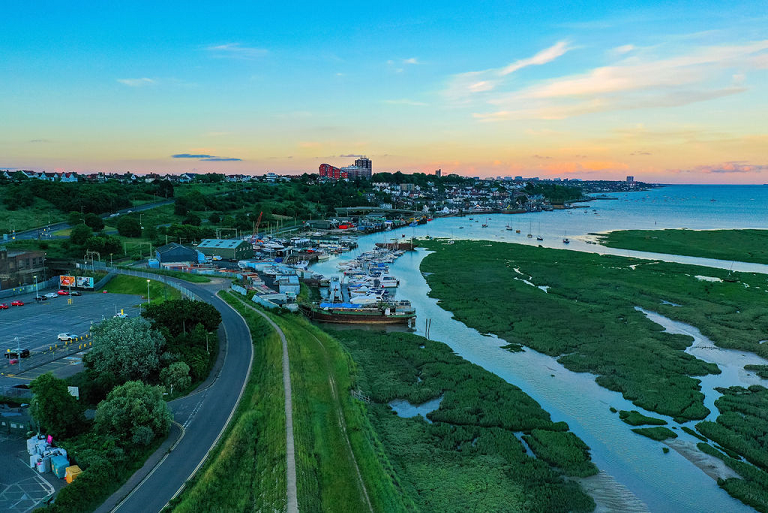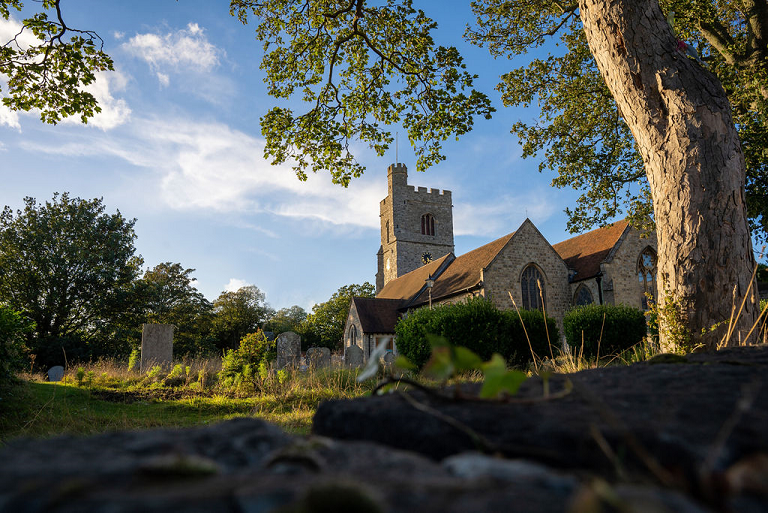Tel: 01702 716288
Tel: 01702 716288 Email Us
Tel: 01702 716288
Leigh-on-Sea has a rich history dating back to Medieval times, mentioned in the Domesday Book as "Legra" the Town was a small manor with livestock and fisherman, and said to be worth 100 shillings. Over a thousand years the Town increased from a small village to a busy fishing town of national importance, trading between the 14th and 18th centuries. It's position on the Thames made it a crucial point for protection from the French, Spanish and Dutch armies and also as a fast route across the Channel.
All research and information regarding Leigh's history has been compiled by Cllr Carole Mulroney. To learn more about Leigh's history you can read Carole's blog HistoricaLeigh, updated fortnightly with amusing and interesting stories or to find out more about important families in Leigh throughout History visit Leigh Lives.

Leigh-On-Sea Ariel Shot

St Clements Church
Leigh recorded in the Domesday Book as "Legra".
1297 - The earliest record of a church in Leigh.
1381 - Thirty Essex rebels executed during the Peasant's Revolt.
The Manor of Leigh was held by Thomas Boleyn, father of Anne Boleyn.
When Thomas Boleyn died the Manor was passed to Anne's sister, Mary, who's family held the Manor for nearly 200 years.
1540 - The earliest reference to a Peterboat in a petition to the Court of Admiralty concerning the alleged robbery of fish in the town.
In the 1570's Leigh was reported as having 31 vessels with 32 masters and 230 mariners and fisherman.
1579 - The Speedwell is the first recorded Leigh built ship weighing 105 tonnes.
Leigh provided at least 6 ships to assist against the Spanish Armada.
1610 - Andrew Battell returns to Leigh after 21 years, having been captured by Indians in Brazil.
The English Fleet was repaired at Leigh after the Battle of Goodwin Sands during the Dutch Conflict.
Captain William Haddock of Leigh was awarded a gold medal from Parliament for his action against the Dutch Fleet. His son and then grandson went on to become Comptroller of the Navy.
Leigh was home of many prestigious Admirals and Masters of Trinity House who are memoralised in St. Clement's Church.
Samuel Pepys mentions Leigh in his diary as his sister-in-law lived in the Town.
In 1714 William Hutton obtained leases of oyster layings in Hadleigh Ray at Leigh and Benfleet. In 1724 Kent fisherman raided the oyster beds, Hutton sued for the loss of 12,000 bushels and £17,000 in damages. He won but was only awared £2,000, it took the men of Faversham 20 years to pay the damages.
John Wesley visited Leigh in 1760.
When work began on Southend Pier in 1829, Leigh fisherman were against the plans on the grounds it would interfere with their occupation.
1834 - Lady Olivia Sparrow erects a school on what is now the Broadway.
1838 - Leigh Rectory was built, which is now home to Leigh Library.
1853 - Old Leigh suffered several epidemics of cholera, and the Billet Club formed to help local fisherman in times of illness.
1855 - The Old Town was literally split in half by the new railway, which meant fisherman's catches could be transported to London much quicker.
There were many reports of smuggling activities in Leigh, in 1872 a Customs Officer noted the canniness of Leigh men.
The Land Company acquired many acres of land in Leigh in 1893, and an Urban District Council replaced the Rural Council in 1897 due to the huge developments taking place. By the end of Victoria's reign, Leigh was a substantial town.
1901 - One of the first tram routes commences from Southend to St. Clement's Church.
1913 - Leigh became part of Southend, despite many objections from Leighmen.
1939 - Once again Leighmen were shipped off to war. Leigh's little ships saved over 1,000 men at Dunkirk.
1953 - Many people in Leigh helped to rescue those in Canvey from the floods.